This was an existing pub of the same name, dating from the 1830s, when it was built by the ancestors of the Arctic explorer Captain Scott. Scott’s family was linked with the services – his grandfather retired from the navy in 1826, buying the Hoegate Street Brewery with his brother. In 1830, grandfather Scott bought Outlands House, near the site of the inn built later that decade.
Prints and text about The Britannia Inn.
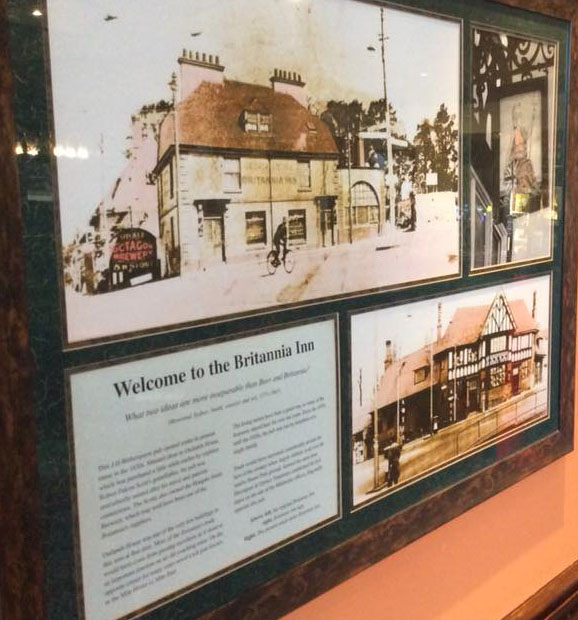
The text reads: This JD Wetherspoon pub opened under its present name in the 1830s. Situated close to Outlands House, which was purchased a little while earlier by explorer Robert Falcon Scott’s grandfather, the pub was undoubtedly named after his naval and patriotic connections. The Scotts also owned the Hoegate Street Brewery, which may well have been one of the Britannia’s suppliers.
Outlands House was one of the very few buildings in this area at the time. Most of the Britannia’s trade would have come from passing travellers, as it stood at an important junction on an old coaching route. On the opposite corner for many years stood a toll gate known as the Mile House or Mile End.
The living seems have been a good one, as many of the licensees stayed here for over ten years. From the 1870s until the 1920s, the pub was run by members of a single family.
Trade would have increased considerably around the turn of the century when Argyle Athletic took over the nearby Home Park ground. Around the same time Devonport & District Tramways established the first depot on the site of the Milehouse offices, diagonally opposite this pub.
Above: left the original Britannia Inn
Right, Britannia Inn sign
Right: The present mock-tudor Britannia Inn.
Illustrations and text about Britannia’s mariners.
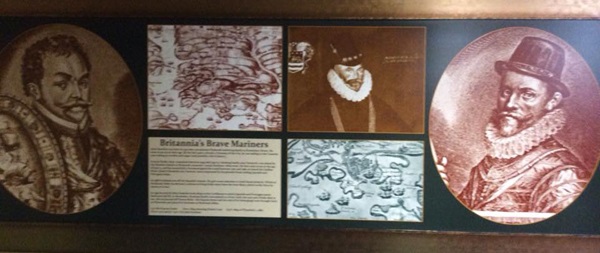
The text reads: John Hawkins was born in 1532 into a prominent Plymouth seafaring family in Kinterbury Street. He went to sea at an early age. By the late 1550s already a Freeman of the City, he was sailing to the Canaries and trading in textiles and sugar (and possibly a bit of piracy).
Francis Drake, born sometime between 1539 and 1545 to a farming family near Tavistock, was raised by the Hawkins family in Plymouth, as poorer ’cousin-brethren’ often were. He first went to sea at the age of just 13, and he successfully circumnavigated the world between 1577 and 1580 on board the Golden Hind. Queen Elizabeth was, however, more impressed by his plunder from raiding Spanish and Portuguese ships.
In 1588 he helped see off the Spanish Armada. He gave some attention to land-based projects. Whilst at Buckland Abbey he devised a scheme to bring fresh water from the river Meavy direct to the town by means of a leat.
In 1595 he and Sir John Hawkins took ships to the Caribbean to attack Spanish and Portuguese ports. Both men fell ill. In December, Hawkins finally succumbed to a fever. Early the next year Drake died at sea. He was buried off Puerto Bello. His famous drum and the rest of his belongings were brought back to Plymouth and placed in his home at Buckland Abbey.
Left: Sir Francis Drake Above: Map showing Drake’s leat
Right: Map of Plymouth, c1580
Above right and far right: Sir John Hawkins.
Prints and text about Plymouth Argyle.
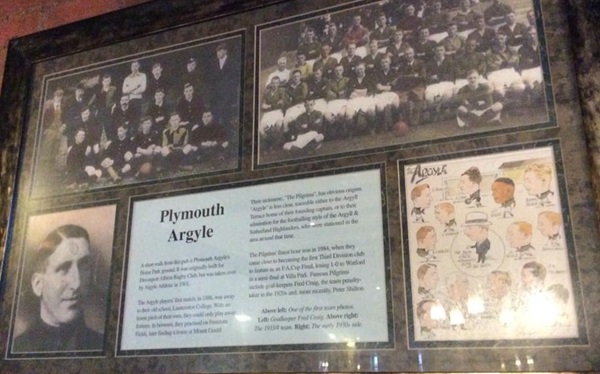
The text reads: A short walk from this pub is Plymouth Argyle’s Home Park ground. It was originally built for the rugby club, but was taken over by Argyle Athletic in 1901.
The Argyle players’ first match, in 1886, was away to their old school, Launceston College. With no home pitch of their own, they could only play away fixtures. In between, they practised on Freedom Fields, later finding a home at Mount Gould.
Their nickname, ‘The Pilgrims’, has obvious origins. ‘Argyle’ is less clear, traceable either to the Argyll Terrace home of their founding captain, or to their admiration for the footballing style of the Argyll & Sutherland Highlanders, who were stationed in the area around that time.
The Pilgrims’ finest hour was in 1984, when they came close to becoming the first Third Division club to feature in an FA Cup Final, losing 1-0 to Watford at a semi-final at Villa park. Famous Pilgrims include goal-keepers Fred Craig, the team penalty- taker in the 1920s and, more recently, Peter Shilton.
Above left: One of the first team photos
Left: Goalkeeper Fred Craig
Above right: The 1933/4 team
Right: The early 1930s side.
Prints and text about Robert Lenkiewicz.
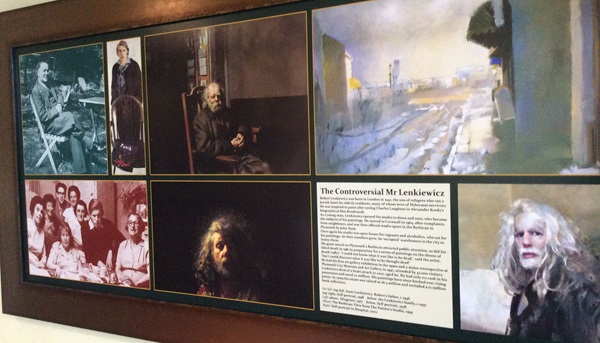
The text reads: Robert Lenkiewicz was born in London in 1941, the son of refugees who ran a Jewish hotel for elderly residents, many of whom were of Holocaust survivors. He was inspired to paint after seeing Charles Laughton in Alexander Korda’s biographical film Rembrandt.
As a young man, Lenkiewicz opened his studio to down and outs, who became the subjects of his paintings. He moved to Cornwall in 1964, after complaints from neighbours, and was then offered studio space in the barbican in Plymouth by John Nash.
Once again his studio was open house for vagrants and alcoholics, who sat for his paintings. As their numbers grew, he ‘occupied’ warehouses in the city to house them.
His giant mural on Plymouth’s Barbican attracted public attention, as did his faked death in 1981 in preparation for a series of paintings on the theme of death (1981): “I could not know what it was like to be dead,” said the artist, “but I could discover what it was like to be thought dead”.
He had his first art gallery exhibition in the 1990s and a major retrospective at Plymouth City Museum and Art Gallery in 1997, attended by 42,000 visitors. Lenkiewicz died of heart attack in 2002, aged 60. He had only £12 cash in his possession and owed £2 million. His paintings have since fetched ever-rising prices. In 2009 his estate was valued at £6.5 million and included a £1 million book collection.
An illustration depicting Rule Britannia, a poem by James Thompson.
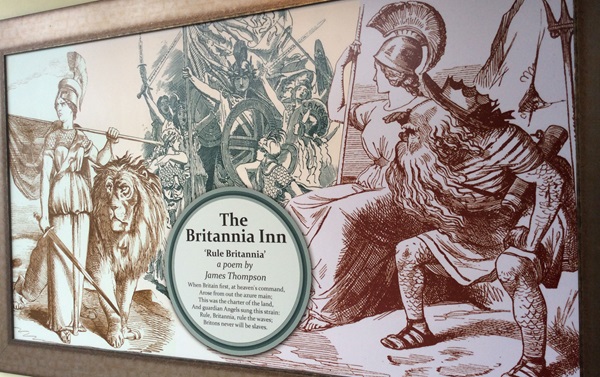
When Britain first, at heaven’s command,
Arose from out the azure main;
This was the charter of the land,
And guardian Angels sung this strain:
Rule, Britannia, rule the waves;
Britons never will be slaves.
External photograph of the building – main entrance.
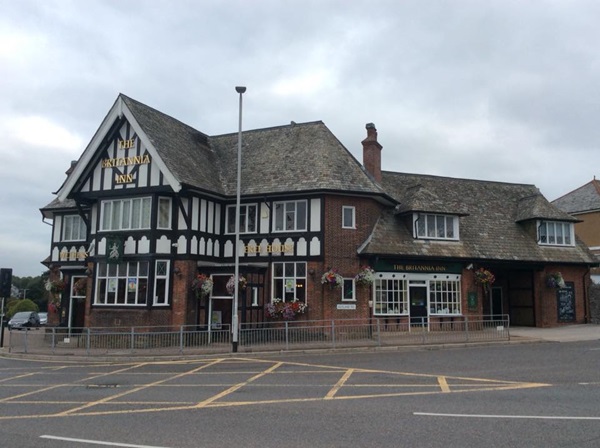
If you have information on the history of this pub, then we’d like you to share it with us. Please e-mail all information to: pubhistories@jdwetherspoon.co.uk